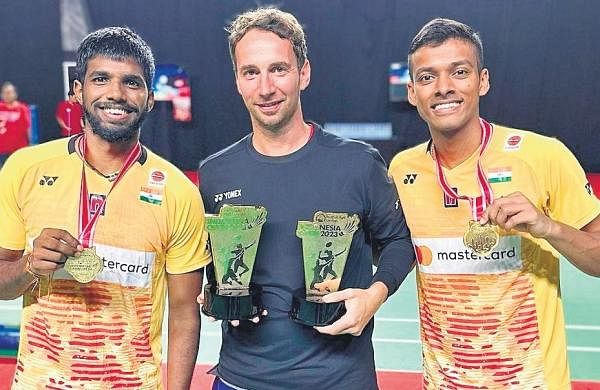
Chirag Shetty and Satwiksairaj Rankireddy, to quote the TikTok generation, have been cooking. They have won titles for fun in 2023. They have closed out matches they had no right to win. They have slapped their opponents for fun. They have wiped out their competition. They have picked up all manner of wins. Then, it’s not a surprise to see why even in a loaded field (nine of 10 and 18 of the top 20 ranked men’s doubles teams are from Asia), Mathias Boe strongly believes his wards have a big chance.
In fact, the Dane believes the tools they have in their kit make them the best pair in the world, currently. “It depends from pair to pair (how do you divorce performance from results),” he told this daily after a training session in Hyderabad ahead of the Asiad. “I feel that if all the pairs play at 100% all the time, I feel that we are the best. We have more tools, we are good at service receiving, best in attacking, we can play from the backcourt with extreme power… feel we are the best.”
But behind the pair’s ascendance from giant killers (they beat the 2021 Olympic champions at the Olympics but failed to advance past the group stages, for example) but lacking that slight bit of professionalism to giants, lies a story of pain, having a lot of fun, learning to communicate in Hindi or English, vibes, sharing a room on tour and becoming friends ‘who share everything with each other’.
When you watch a Rankireddy-Shetty match, one of the first things that hits you is the way in which they are able to marry their intensity with fun, one of the most elemental things in all of sport. While Shetty says the day ‘badminton feels like a burden, that will be my last day’, the pair worked to get this comradeship where it is today. Here’s Rankireddy, 23, three years Shetty’s junior. “It certainly wasn’t fun, at least for me, in the initial days,” he laughs while speaking to this daily.
“I had a communication problem. I wasn’t good in English or Hindi. I used to think for five seconds… ‘kya bolna (what should I say)’. There have been many times I used to think that during games. Used to tell him ‘flick, flick’. It was tough. I used to play with a Telugu partner, Krishna Prasad.
“But we travel together, play together, go out together… got to understand how he thinks and vice versa. We both got to understand how the other person thinks under pressure, it’s more about communication. Now, if I’m having an off day, then he can sense it and he steps up and it works the other way around. We have that understanding now.”
That understanding cuts so deep the Amalapuram shuttler is on his toes whenever he hears people singling one of them for praise while criticising the other after a match. “We don’t take it as ego. ‘Shetty bhai played well’ means we both played… so I take it in a positive way. A lot of people will come with this, especially when you play doubles, someone will say ‘you are playing well, you are not playing well… matlab I don’t take it as a negative, I take it as ‘Shetty bhai played well’ means ‘haan, maybe Shetty bhai and me are one and the same. We don’t take it as a difference. If my partner plays well, that’s good for me, right (laughs)? It’s not an advantage for the other team. We both are the same so, when you understand these things… we don’t want any of this stuff to disturb our bond and we don’t take so many things to our heads. We just play and have fun.”
Even on TV, that aspect of the pair’s relationship is visible. At the heart of this relationship, though, is not treating it as a day job. “I feel whenever I’m on court, I feel alive; the best version of myself is when I have a racquet in hand and playing,” Shetty says. “If I don’t have that passion, that’s the last day I will play badminton. That is the most important thing, needing to have fun when you are on court and not think of it as a burden.”
And it’s not like they are faking it. “It’s almost like we are living together,” the Mumbai shuttler says. “When you share the same room during tournaments, having meals together, exploring cities together (if there is time), we have sort of created that friendship off the court and it reflects on the court as well. I think it’s quite important.”
The positive vibes are now off the charts that they actually pre-plan on court celebrations which they bring out after big wins. “I think it started with the Thomas Cup. There it was very natural. Didn’t really think of any celebration, we were in a different world altogether. Now, we actually think about it (post-match celebrations). It’s sort of become a norm after the Thomas Cup,” Shetty smiles.
At Hangzhou in October, they hope to go to a place Indian badminton has never travelled to before — gold at the Asian Games.
This post was originally published on this site be sure to check out more of their content.







